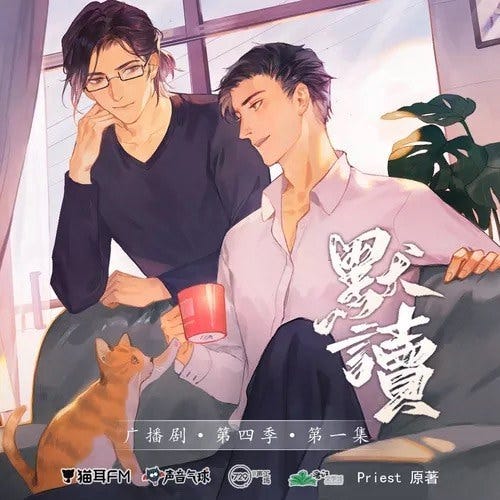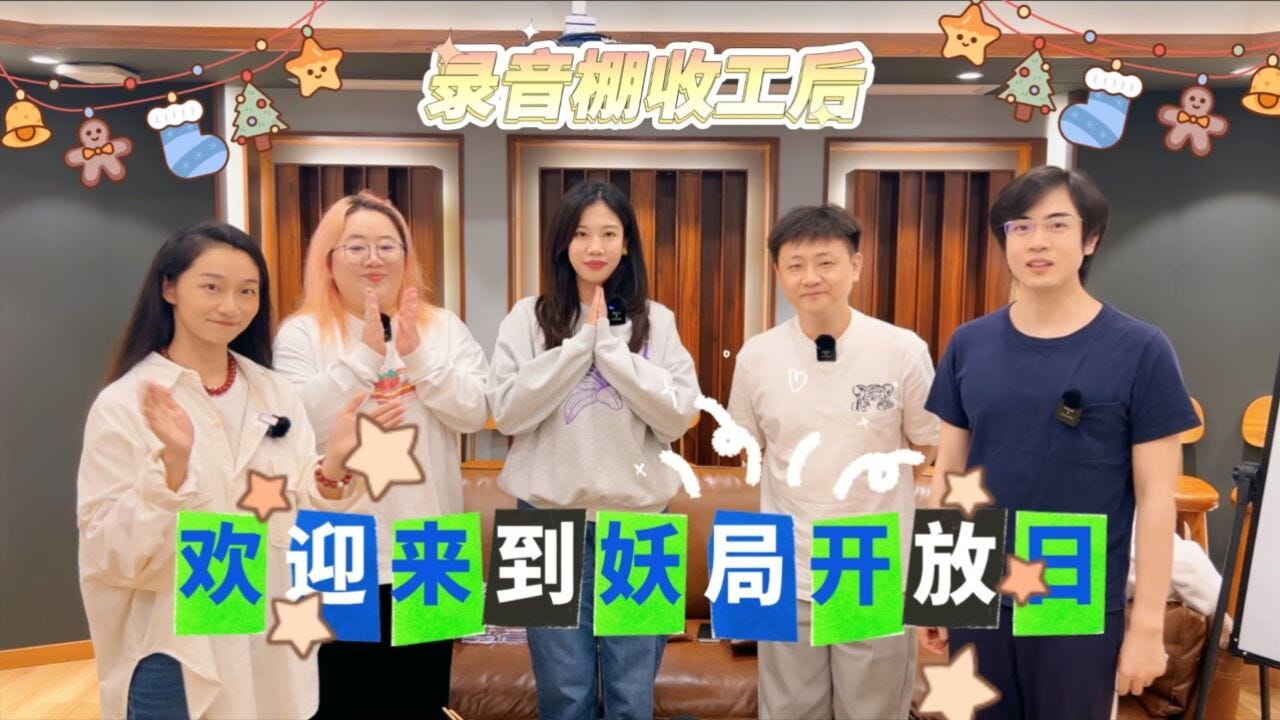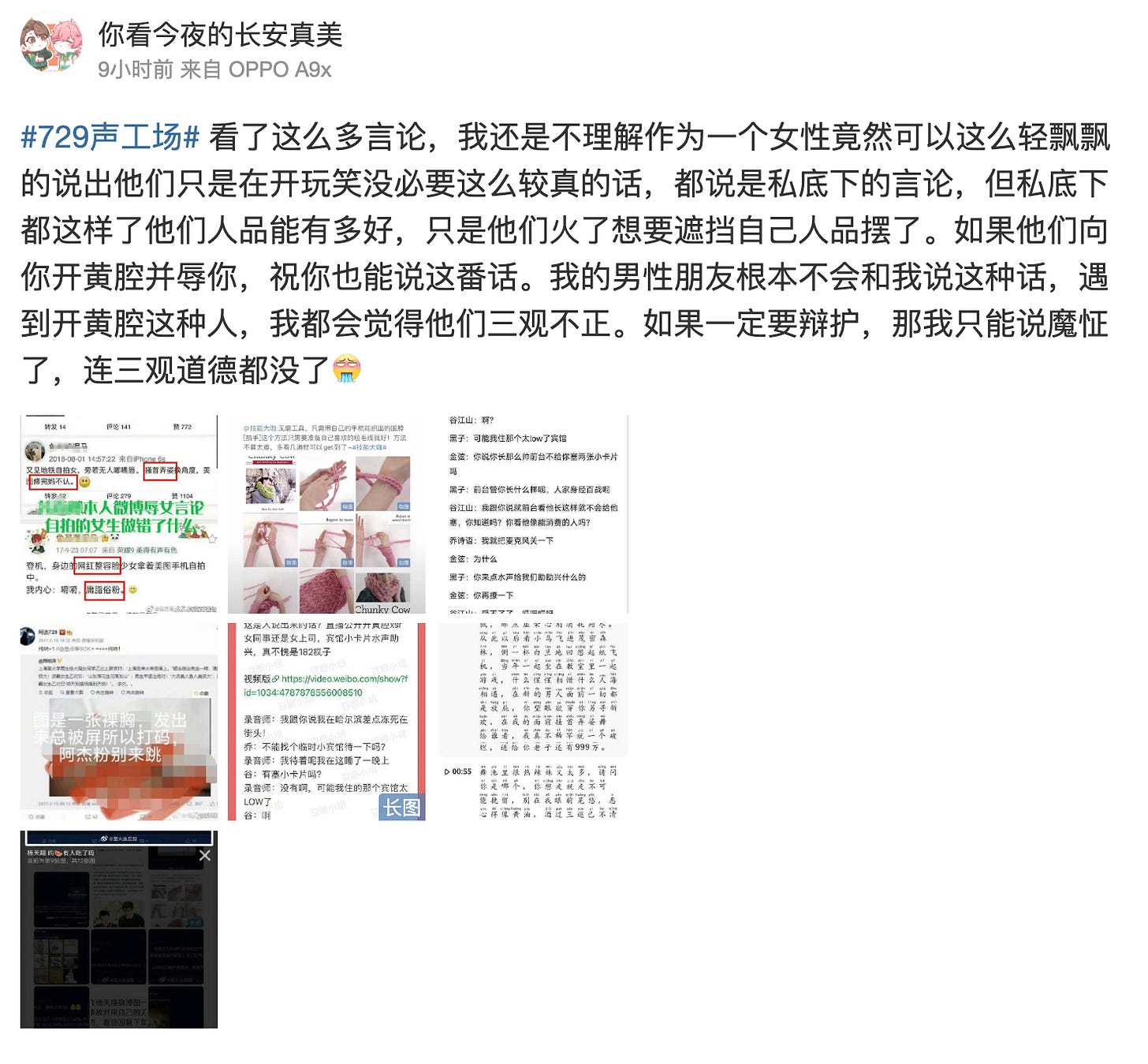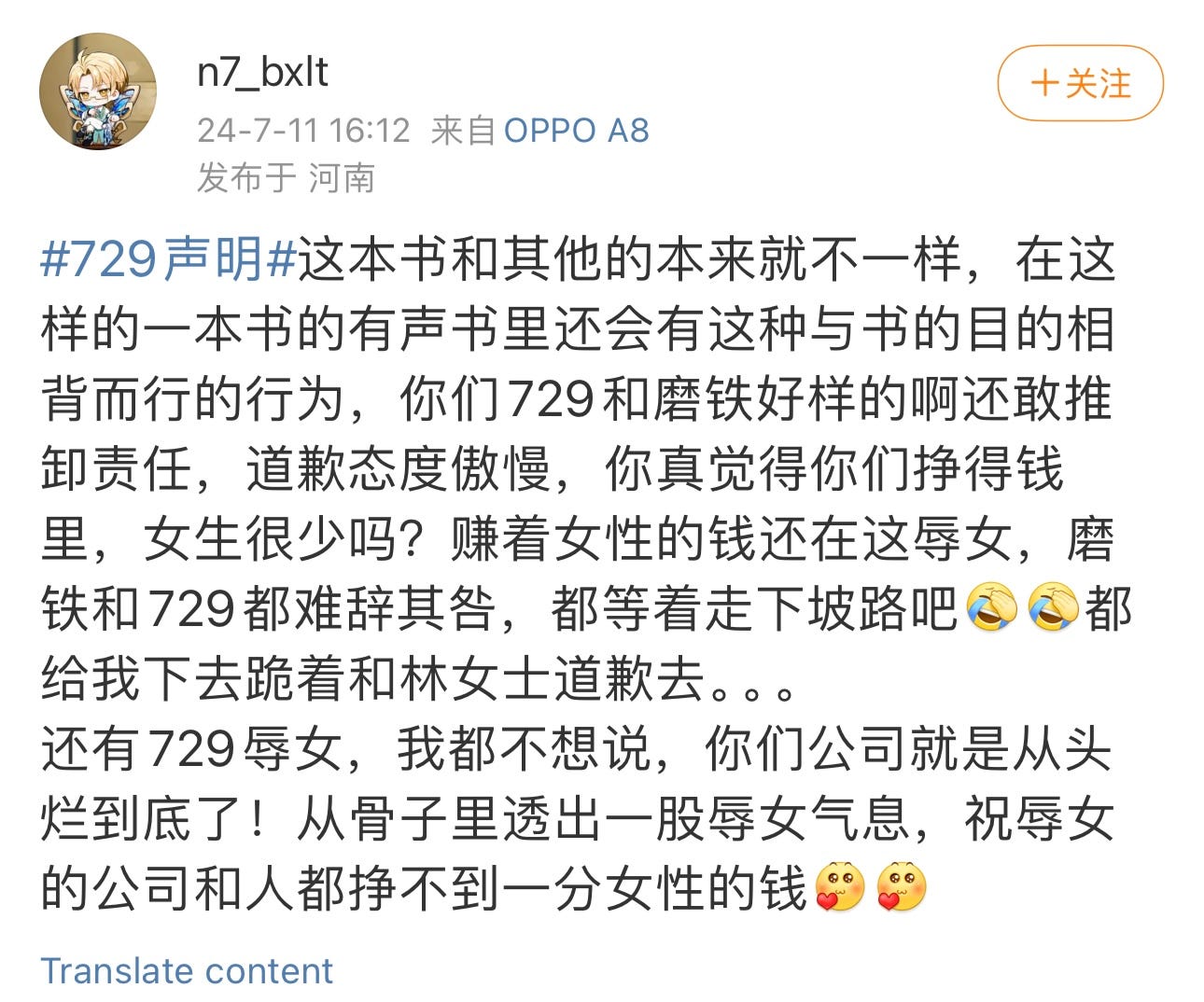Hi there. Welcome to Active Faults.
In the last issue, I talked about the phenomenon of influencers entering the sphere of media and entertainment constituting a process that I’m temporarily terming “pan-celebrification”. It is no longer just about the actors, singers, models and idols. To keep up with fanquan, you’d have to traverse every crevice of Douyin&co. You’d have to know the rippling fan clusters formed around insularly influential personalities and the micro-trends they stir up. It will eventually reach the traditional arena if it gathers enough of a wave.
Today, I’m introducing you to a group of such pan-celebrities that long deserved some scrutiny: the circle of character voices or CV (CV圈).
First of all, we need to breeze through some cue cards about 广播剧, radio drama, as a genre. Again it was exported goods, but not from BBC who allegedly made the world’s first radio drama in 1930. The voice actor or seiyu (声優) line of work in Japan has been booming since the early 2000s because of their ACG production pipelines (Animation, Comics and Games). 1 Characters from this “two dimension world” (二次元, taken from the Japanese word nijigen meaning the ACG world) needed real-person dubbing if the story is to be adapted into televised series or films, hence fuelling the rise of generations of excellent voice actors. At the same time, Japan had a burgeoning collection of dramas playing at radio stations that were dubbed ACG stories in audio form. All the while, mainland has been watching this from afar.
Since 2010 or so, mainland anime and/or voice-acting enthusiasts started to experiment with producing Mandarin radio dramas adapted from ACG stories or, more often than not, web fiction published on Jinjiang Literature City, Tieba as well as other forums. And what’s also on those platforms, you might be thinking? Why does that sound familiar? Yes. They are the oldest dens for Chinese original danmei fiction or, if you prefer the Japanese terms, the yaoi or the boy-love (BL) stories about male homosexual relationships.
Radio drama in mainland is staggeringly yaoi-fied. It is almost exclusively associated with male-male pairings, shipping and homoeroticism because that’s how the genre took off. Heterosexual romance was already abundantly portrayed on mainstream television and media spaces, if not over-represented as cliches and tropes. Male-male shippers craved to further actualise their pairings in tangible ways and fantasise about their interactions more creatively and conveniently. Radio dramas sprung out of raw need.
And they are no simple audiobooks. China’s first dedicated radio drama platform, 猫耳FM, was no Audible. For a 广播剧 to be completed, much more needs to be done other than hiring somebody with a calming voice to do a line-by-line recital. The original story would be drastically remodelled into a succinct plotline across limited episodes, re-imagined and brought to life by a crew of voice actors known as CVs. Before radio dramas got streamlined and “industrialised”, CVs would use the then booming voice-only chat room services like YY to congregate, brainstorm, rehearse and record their acting, much like how you’d burn a CD of your band that you founded in your garage. Back in the days, a radio drama could take months to years to be released because it was purely a craft of the amateurs.
Then, capital stepped in. There were a few breakout radio dramas that attracted enough attention for the entire gig to seem profitable. Amateur CV communities made themselves into memorable brands, and turned into studios that were registered companies with millions worth of seed funding and angel investment, or even the backing of Bilibili.2 They transitioned into commercial voice-acting (商配), signing up to freelance voiceovers for mainstream animations, television series and otome games. The aforementioned 猫耳FM started to bulk-purchase the adaptation rights of a ton of web fiction and contract these now semi-professional CV studios to make radio drama versions.
Now, a 广播剧 staff roster contains a project coordinator, casting manager, editors, sound effects specialists, recording producers, graphic designers, marketing experts, social media agents, equipment manager and more. Some of the most popular Chinese danmei fiction of all time, like the author Priest’s “默读” or 墨香铜臭’s “Mo Dao Zu Shi” are adapted into multiple seasons, generating tens of thousands of listens and torrential revenue.
I had my radio drama phase too, of course. I remember downloading 猫耳 and feeling like I’m opening a portal to a new dimension. The appeal is that you can’t never be too disappointed. You see, the peril that every dangai faces when being adapted is having an anti-climatic, underwhelming or downright revolting choice of an actor so out-of-character that he does an injustice to his fictional counterpart. That a real-life person can never replicate a perfect lover’s charms on paper (which I see truth in because the ideal can never be transcended). Fanquan is essentially saying no adaptation is one thing, and a shitty portrayal is another. I beg you don’t embarrassingly ruin the book for us, motherfuckers.
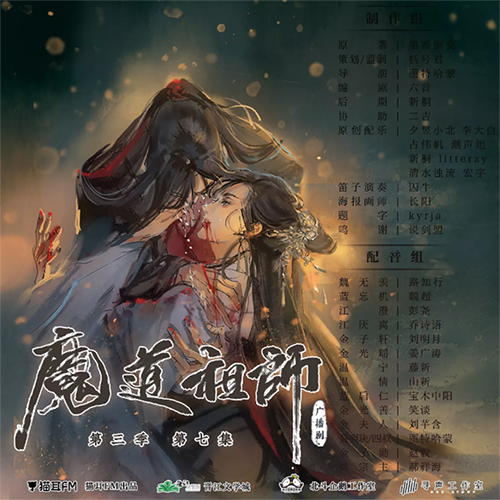
Radio drama can’t do too much ruining as long as the voices have an above-average liking to the original, whatever the original is characterised to sound like. They leave just about enough to your imagination, still, and do just about enough to enliven your ship as if they are someone in your reality.
Speaking of leaving things to the imagination: because audio censorship was not as prevalent as visual content censorship, a lot of radio dramas began to slowly test the waters of mature ratings and smutty scenes (though not anymore). Ear porno was part of its original appeal for sure. On some occasions, CVs had to do a lot of grunting, heavy breathing and moaning.
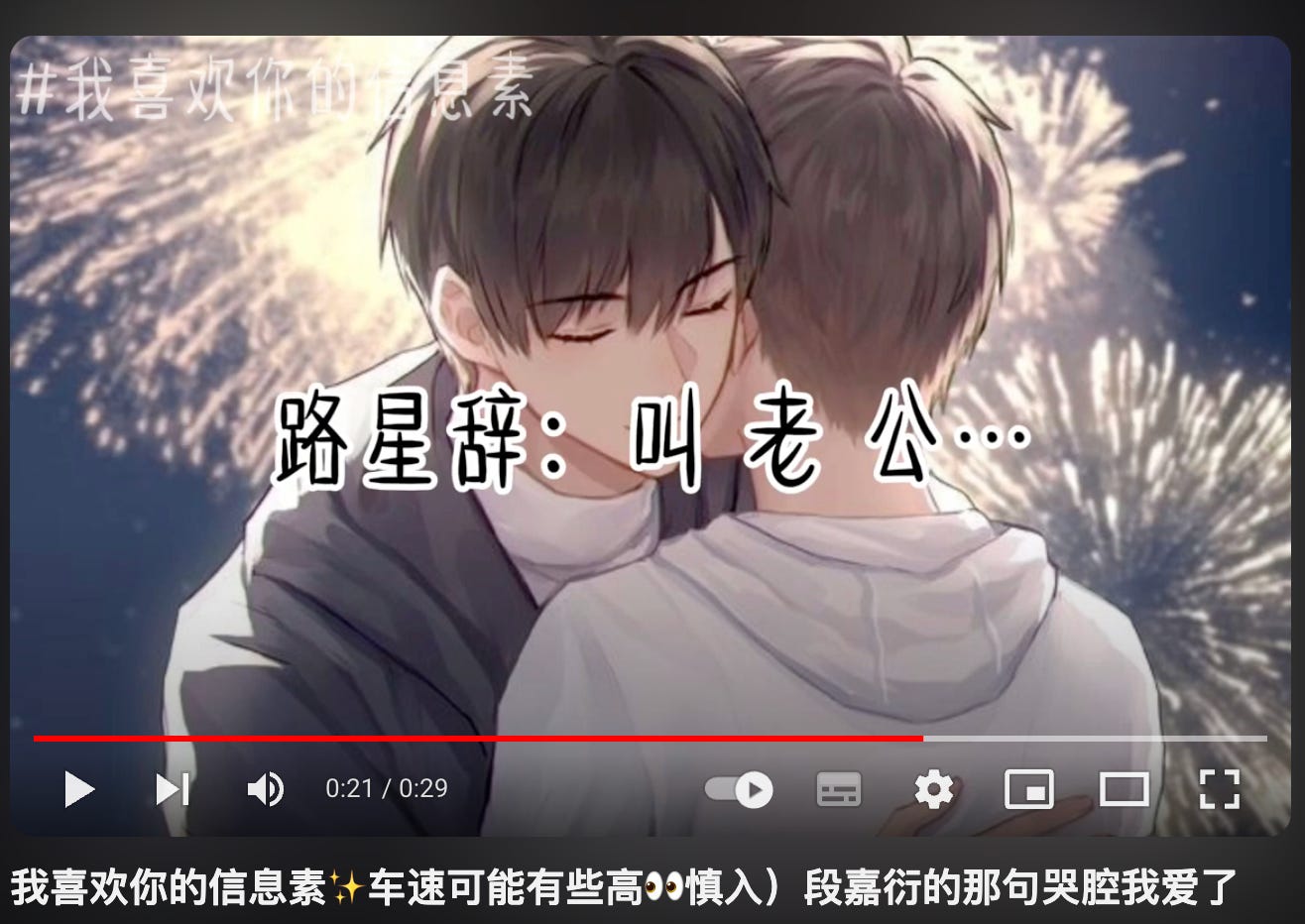
Notice this: by now, a CV has everything a neiyu celebrity needs to become famous. A PR team that promotes his role. A fan base of the original text that he naturally inherits by starring in the adaptation. A little bit of homoeroticism. A little bit of sexualisation so you can satisfy fan fantasies. Play the role adequately well and a pan-celebrity is born.
Out of all the reputable CV studios, “729声工厂” ranks amongst the top with over 1.4 million followers on Weibo. Its founder, Zhang Jie, has over 5 million and the average 729 staff has over 500K at least. The A-lister CVs have got their fan clubs, fan events, birthday banners, the usual drill. People can form quite intense parasocial connections with the voice of their beloved character. Any radio drama featuring cast members under the 729 label nowadays is almost guaranteed traffic and recognition, the brand is very well-respected for its lineup and production quality.
However, that doesn’t prevent them from getting embroiled in public shunning, as 729 CVs habitually spout misogynistic remarks when responding to news or tabloid headlines. More than one male CV of 729 has been accused of raging sexism and using inappropriate, harassing language on more than one occasion.
Their most recent trespass is what prompted me to write this piece. 729 has created an audiobook (in partnership with 磨铁图书 a publisher) of Taiwanese author Lin Yi-Han's “Fang Si-Chi's First Love Paradise” (房思琪的初恋乐园). It is an agonising autobiographical novel about a young female student being continuously sexually assaulted by her teacher. I cannot recommend it enough nor overstate how monumental this text is to feminist communities——women in general——in the Chinese-speaking world. It pulls on our heartstrings because it relates to a quintessentially Asian experience of being violated, controlled, grazed upon and silenced. Tenderly written with masochistic precision and clarity, Lin radicalised us in ways that Second Sex or Gender Trouble couldn’t. She committed suicide shortly after publishing it.
In 729’s adaptation of Lin’s work, scenes of the protagonist’s assault were allegedly pornographised with sounds of moaning and penetrative sex. Almost a week has passed since the news broke. 729 is still trending every day as more and more netizens speak up against such a heinous affront of the text, Lin herself and many other sexual assault victims. People start to cite 729’s track record of misogyny to support their accusations, many of whom ex-fans who had to leave the “cesspool” that is the CV circle.
What particularly angered and fascinated me is a CV’s complete anonymity, hence their “judicial” immunity on such an occasion. Most CVs are active under a pseudonym and never post any photos, lest radio drama fans associate their favourite character’s voice with an unpleasant face. Even their voices are “character voices”. They exist to disappear into the void and become a vessel for illusions. Because of it, the real misogynist would never be held accountable. At the end of the day, they are only pan-celebrities after all, not well-known enough to cause a stir and be properly punished. They’re escaping repercussions on multiple levels.
Although they have speedily released an official apology, I think there’s no going back this time. From the outrage I’m seeing, 729 has stepped on a sore spot for real and triggered a mudslide of pent-up discontent. “CVs are catering to women and earning women’s money,” one comment writes, “how dare you insult women and trivialise women’s pain?” Others point to the systemic issue that male CVs have dominated the industry leaving no opportunities for female CVs, who are routinely sidelined.
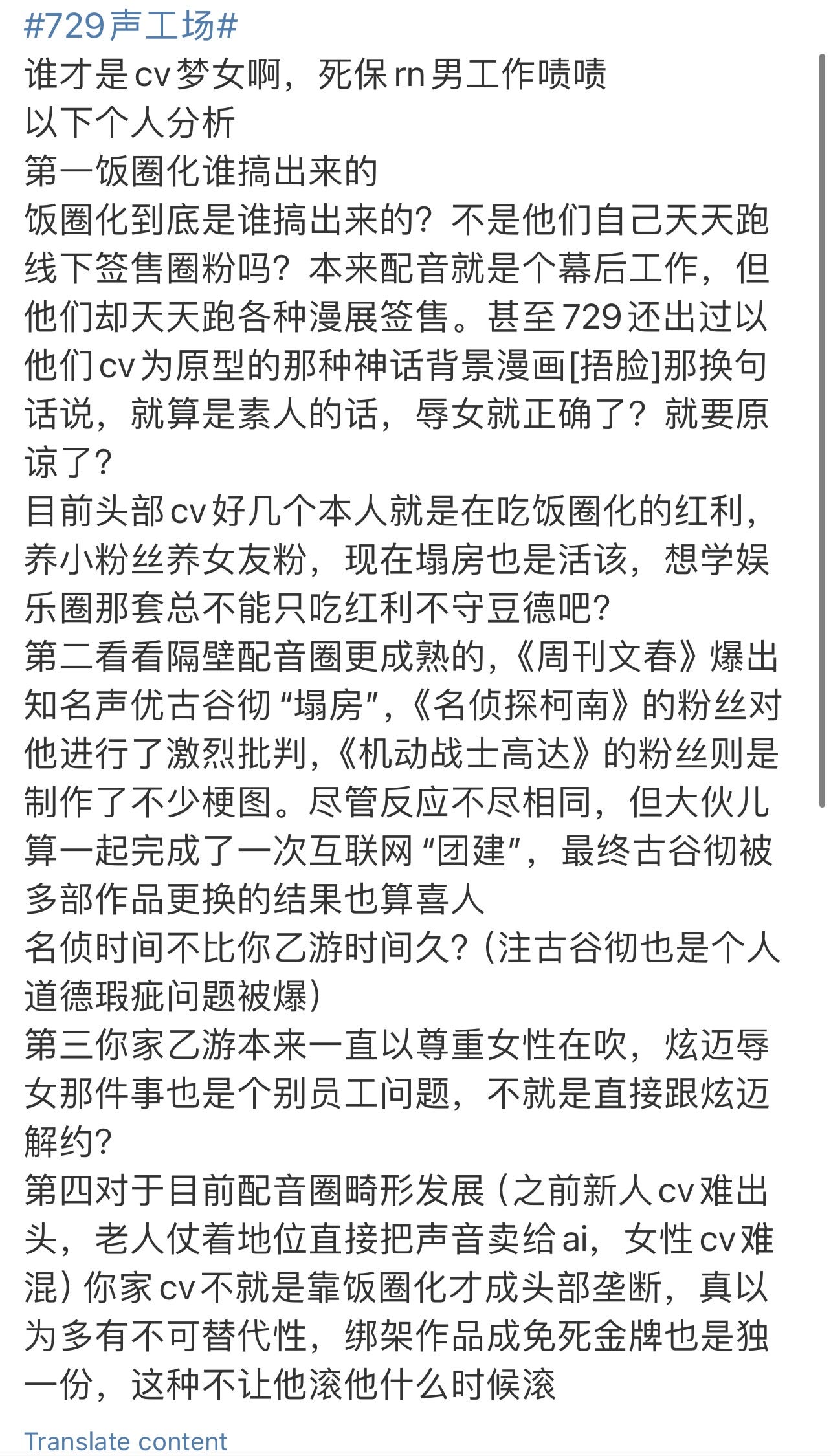
I’ll finish with a translation of this longer think piece because it touches on so many topics of AF’s interest:
Who are the protective Dreamgirls of misogynistic male CVs?
CVs are the ones who fanquanised their community, we didn’t do it. They started going to offline fan signs and comic con events despite how CV is an off-screen, back-of-the-curtain profession. They encouraged everything. Now the A-lister CVs are reaping the benefits of a fanquanised CV circle, building an entourage of younger fans and girlfriend fans, so they deserved this house-falling. If you’re copying neiyu and their inner workings, surely you can’t get the benefits only without obeying idol ethics?
Look at our nextdoor neighbour (Editor’s Note: Japan) and their CV circle. Their public has condemned house-falling CVs without fault, every single time.
The whole circle right now is growing dysfunctionally. New CVs can’t get a breakout. Old CVs are using their seniority to sell their voices to AI (Editor’s Note: I don’t know what’s going on here and I gotta look into it), female CVs can’t make a living. CVs are not replaceable and it got its success based on fanquanisation. Stop holding the canon (Editor’s Note: original works that they are voicing for) hostage, thinking that you’d get out of jail because you’re tied to a big IP. They gotta pack up and get lost. 3
Japan doesn’t actually use the acronym ACG and it’s MAG instead (Manga, Animation, Games).
A couple more useful articles that I’m indebted to:
https://ent.ifeng.com/c/7gi2r8Cftrw
https://m.thepaper.cn/newsDetail_forward_16995758





